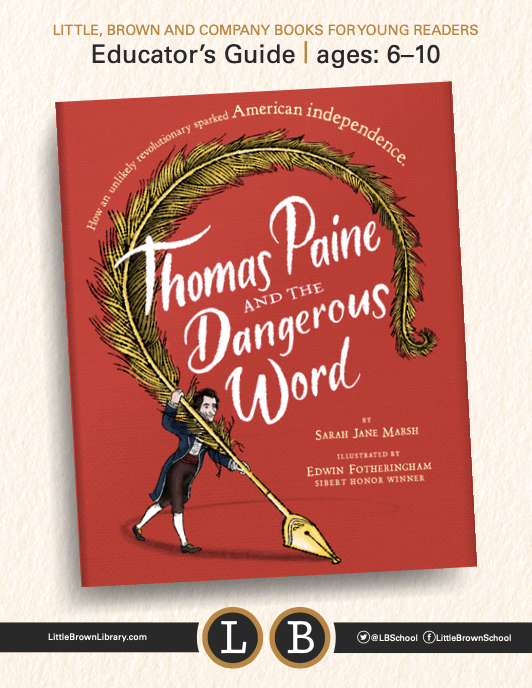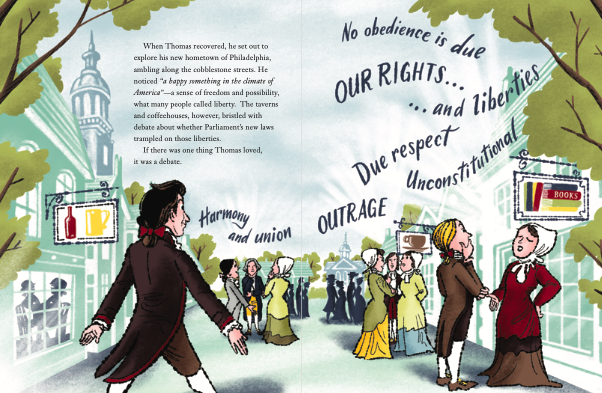Thomas Paine and the Dangerous Word
As an English corset-maker’s son, Thomas Paine was expected to spend his life sewing women’s underwear. But as a teenager, Thomas dared to change his destiny, enduring years of struggle until a meeting with Benjamin Franklin brought Thomas to America in 1774…and into the American Revolution.
Within 14 months, Thomas would unleash the persuasive power of the written word as Common Sense - a brash wake-up call that rallied the American people to declare independence against the mightiest empire in the world.
It was shocking. It was explosive.
“Common Sense,” wrote George Washington, “is working a powerful change.”
This fascinating and extensively researched biography, full of primary sources, will immerse readers in Thomas Paine’s inspiring journey of courage, failure, and resilience that led a penniless immigrant to change the world with his words.
Illustrator: Edwin Fotheringham
Editor: Rotem Moscovich
Art Designer: Maria Elias
ISBN 978-148478144-9
ORDER ONLINE
“BEST BOOKS ABOUT FOUNDING FATHERS”—biography.com
Thomas Paine’s pamphlet “Common Sense” helped sway public opinion in favor of the American Revolution. But as this engaging, colorfully illustrated book for young readers explains, Paine had no formal education. As the son of a corset-maker from England, Paine was instead trained to sew women’s undergarments. Aimed at Elementary School readers, this biography is no mere picture book. It’s packed with research to show how Paine came to change the world with his words.
american library association, *starred review*
Thomas Paine, author of the pamphlet Common Sense, which rallied the colonists to break from England, gets a strong, smart treatment here. Paine was born the son of a corset maker and undergarments were to be his future. But a love of reading gave him a way with words, and a thirst for adventure brought him to America in 1774, just as the colonies were trying to decide their fate. Common Sense, which was published in 1776, contained the shocking word independence. The Founding Fathers took note, the public snapped up copies, and the pamphlet was reprinted multiple times and became one of the things the Revolutionists rallied around.
In her debut, Marsh does a fine job of mixing the personal and public elements of Paine’s life; he comes across as not just a historical figure but a fully realized fellow with hopes and dreams, enthusiasms and disappointments. She also makes note of Paine’s abolitionist views, an integral but often forgotten part of his story. Her lively text is complemented by Fotheringham’s artwork, hand-drawn on a digital device, which sets the mood on every page. Though his palette is rather somber—browns, golds, and greens—his cast springs to life and have almost a Disney appeal. The back matter offers lots more information, especially about Paine’s surprising end.
THe horn book
Corset maker. Sailor. Tax collector. Husband. Thomas Paine fails at all these pursuits. But what he can do is write and persuade, and when in 1774 he immigrates to the American colonies, he finds employment as an editor of Pennsylvania Magazine and thus begins his career as a political editorialist. The outspoken and opinionated Paine writes compellingly of the political situation in the colonies, and equally strongly of other injustices, such as slavery. Still, there is one word even Paine hesitates to use in his early writings: independence. His passion rises when writing his magnum opus Common Sense, however, and he boldly employs that revolutionary word twenty-two times.
As author Marsh comments in an afterword, Common Sense “went viral”; six months after its publication, Congress approves the Declaration of Independence. The power of the pen resonates both in the narrative and in illustrations depicting Paine brandishing a quill pen that grows in size as his words capture the imagination of the colonists. Making the point that words matter, Fotheringham flings hand-lettered words, phrases, and written documents across the pages marking a turning point in Paine’s life. This stirring biography moves along briskly, with the momentum for severing ties with Great Britain paralleling Paine’s literary output. But Marsh’s clear prose style and short, declarative sentences allow readers to follow events easily — and even to slow down and think about them. Appended with three author’s notes, a bibliography, a timeline, and documentation for quotations.




